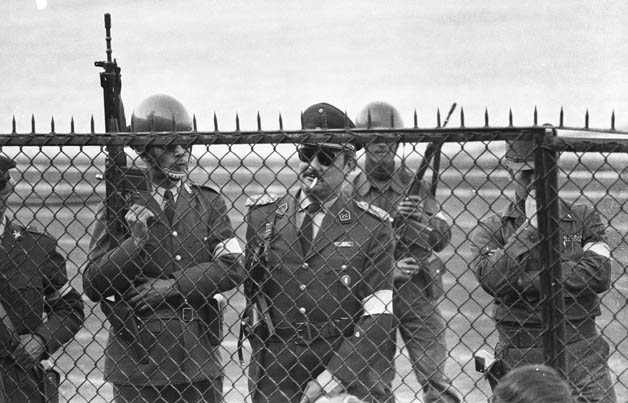
CJA filed Cabello v. Fernández Larios before the U.S. District Court for the Southern District of Florida in 1999. The suit accused former Pinochet operative Armando Fernández Larios of complicity in the 1973 torture and murder of Winston Cabello, one of 13 innocent men murdered by the infamous death squad known as “Caravan of Death” at the Copiapó military prison in Chile. The charges – including crimes against humanity, extrajudicial killing, torture, and cruel, inhuman or degrading treatment – were brought under the Alien Tort Statute (ATS) and the Torture Victim Protection Act (TVPA), laws which allow for civil suits in U.S. courts to remedy a limited set of human rights violations.
The trial ended in victory, marking the first verdict handed down by a U.S. jury for crimes against humanity and the first time a U.S. court heard claims of atrocities committed by the Chilean military following the September 11, 1973 coup. The case provided the family of Winston Cabello, and other victims of the death squad, much-needed accountability against the former Chilean commander, whose continued presence in the United States was, in part, an attempt to escape justice for his crimes in Chile.
After CJA filed the lawsuit, defendant Fernández Larios filed motions for dismissal and summary judgment on the grounds that the claims were untimely filed after the expiration of the ATS and TVPA’s 10-year statute of limitations period. However, the District Court applied the principle of equitable tolling of the statute of limitations period, since the Cabello family did not have certain knowledge of Winston’s death following his disappearance in 1973, and did not discover the circumstances nor the horrific manner of his death until 1990, when forensic teams finally were able to locate and exhume his remains from a secret mass grave.
Trial & Verdict
The trial took place over three weeks and included extensive documentary evidence and witness testimony. Fernández Larios was present throughout and was forced to take the stand and answer questions about his role in the death squad and the widespread and systematic violence in Chile. On October 15, 2003, a Miami jury found Fernández Larios liable for torture, crimes against humanity, and extrajudicial killing. The jury awarded $4 million in compensatory and punitive damages to the plaintiffs: Zita Cabello Barrueto, Karin Moriarty, Aldo Cabello, and Elsa Cabello – the sisters, brother and mother of Winston Cabello, respectively.
Appeal
Fernández Larios appealed the verdict, attempting to reintroduce the argument that the lawsuit, filed 26 years after the alleged events, was time-barred by a 10-year statute of limitations. On March 14, 2005, a three-judge panel of the Eleventh Circuit Court of Appeals rejected all of Fernández Larios’ arguments and upheld the verdict.
The Cabello family’s victory was a powerful vindication for the survivors of Pinochet’s regime. The trial marked the first time any Pinochet-era perpetrator had been tried in the United States, as well as the first jury verdict for crimes against humanity in the United States.
CJA’s case against Fernández Larios is only part of the accountability efforts necessary for justice against the former Pinochet operative. Fernández Larios came to the United States in 1987 after reaching a plea agreement with U.S. federal prosecutors and pleading guilty to assisting in the 1976 car-bomb assassination of former Chilean ambassador Orlando Letelier and his American assistant Ronni Moffitt.
After serving a five-month federal prison term, Fernández Larios moved to Miami, Florida where he remained outside the reach of Chilean courts. In 1999, Judge Juan Guzmán in Chile ordered the arrest of five retired military officers – including a general – for their participation in the Caravan of Death and the 75 summary executions committed by the death squad. In 2007, Fernández Larios was included in the criminal indictment for the Caravan of Death case in Chile.
An Argentinian court has also sought extradition of Fernández Larios for his alleged role in the September 1974 assassination in Buenos Aires of former Chilean army commander Gen. Carlos Prats, and his wife Sofía Cuthbert. The request has been pending since 2002. In 2015, Chile indicted Fernández Larios once more, this time for his role in the 1976 kidnapping and killing of a Spanish diplomat, Carmelo Soria. Soria was targeted by the late dictator, Augusto Pinochet, for being a suspected member of the then-banned communist party.
